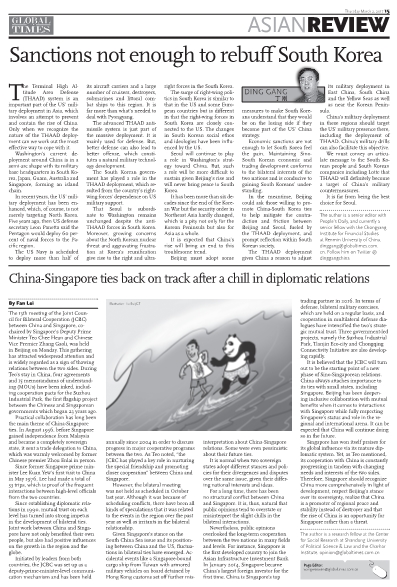2月27日,第13次中国新加坡双边合作联合委员会(JCBC)会议在北京举行,标志着自去年以来触冷的中新关系开始回暖,我中心研究人员范磊博士应《环球时报》英文版之邀撰文评述中新关系,3月1日《环球时报》英文版(Global Times)官方网站上载文章,3月2日《环球时报》英文版第15版“ASIAN REVIEW”以“China-Singapore ties back on track after a chill in diplomatic relations”为题正式刊发见报。内容如下:

China-Singapore ties back on track after a chilling spell
By Fan Lei Source:Global Times Published: 2017/3/1 13:38:39
The 13th meeting of the Joint Council for Bilateral Cooperation (JCBC) between China and Singapore, co-chaired by Singapore's Deputy Prime Minister Teo Chee Hean and Chinese Vice Premier Zhang Gaoli, was held in Beijing on Monday. This gathering has attracted widespread attention and is widely regarded as a sign of thawing relations between the two sides. During Teo's stay in China, four agreements and 15 memorandums of understanding (MOUs) have been inked, including cooperation pacts for the Suzhou Industrial Park, the first flagship project between the Chinese and Singaporean governments which began 23 years ago.
Practical collaboration has long been the main theme of China-Singapore ties. In August 1956, before Singapore gained independence from Malaysia and became a completely sovereign state, it sent a trade delegation to China, which was warmly welcomed by former Chinese premier Zhou Enlai in person.
Since former Singapore prime minister Lee Kuan Yew's first visit to China in May 1976, Lee had made a total of 33 trips, which is proof of the frequent interactions between high-level officials from the two countries.
Since establishing diplomatic relations in 1990, mutual trust on each level has turned into strong impetus in the development of bilateral ties. Joint work between China and Singapore have not only benefited their own people, but also had positive influences on the growth in the region and the globe.
Initiated by leaders from both countries, the JCBC was set up as a deputy-prime-minister-level communication mechanism and has been held annually since 2004 in order to discuss progress in major cooperative programs between the two. As Teo noted, "the JCBC has played a key role in nurturing the special friendship and promoting closer cooperation" between China and Singapore.
However, the bilateral meeting was not held as scheduled in October last year. Although it was because of scheduling conflicts, there have been all kinds of speculations that it was related to the events in the region over the past year as well as irritants in the bilateral relationship.
Given Singapore's stance on the South China Sea issue and its positioning between China and the US, fluctuations in bilateral ties have emerged. Accidental events like a Singapore-bound cargo ship from Taiwan with armored military vehicles on board detained by Hong Kong customs set off further misinterpretation about China-Singapore relations. Some were even pessimistic about their future ties.
It is normal when two sovereign states adopt different stances and policies for their divergences and disputes over the same issue, given their differing national interests and ideas. For a long time, there has been no structural conflict between China and Singapore. It is, thus, natural that public opinions tend to overstate or misinterpret the slight chills in the bilateral interactions.
Nevertheless, public opinions overlooked the long-term cooperation between the two nations in many fields and levels. For instance, Singapore is the first developed country to join the Asian Infrastructure Investment Bank. In January 2014, Singapore became China's largest foreign investor for the first time. China is Singapore's top trading partner in 2016. In terms of defense, bilateral military exercises, which are held on a regular basis, and cooperation in multilateral defense dialogues have intensified the two's strategic mutual trust. Three government-led projects, namely the Suzhou Industrial Park, Tianjin Eco-city and Chongqing Connectivity Initiative are also developing rapidly.
It is believed that the JCBC will turn out to be the starting point of a new phase of Sino-Singaporean relations. China always attaches importance to its ties with small states, including Singapore. Beijing has been deepening inclusive collaboration with mutual benefits when it comes to interactions with Singapore while fully respecting Singapore's status and role in the regional and international arena. It can be expected that China will continue doing so in the future.
Singapore has won itself praises for its global influence via its mature diplomatic system. Yet, as Teo mentioned, its cooperation with China is constantly progressing in tandem with changing needs and interests of the two sides. Therefore, Singapore should recognize China more comprehensively in light of development, respect Beijing's stance over its sovereignty, realize that China is a promoter of regional peace and stability instead of destroyer and that the rise of China is an opportunity for Singapore rather than a threat.
The author is a research fellow at the Center for Social Research at Shandong University of Political Science & Law and the Charhar Institute.
Posted in: ASIAN REVIEW 稿件地址:http://www.globaltimes.cn/content/1035434.shtml